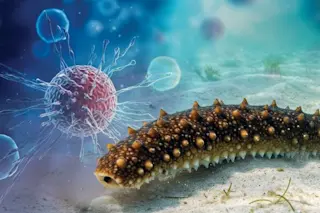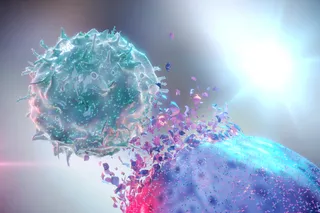The next breakthrough in cancer therapy could come from the seafloor, where sea cucumbers hold a secret solution. These unassuming creatures may not look the part of a medical hero, but a sugar compound they possess shows promise as a precious resource that may be able to stem the tide of cancer growth.
A recent study published in Glycobiology has shown that this sugar compound produced by sea cucumbers — called fucosylated chondroitin sulfate — can curb a particular enzyme responsible for the spread of cancer. Despite concerns about the limited availability of sea cucumbers, the compound is expected to become a crucial blueprint for future cancer research.
The Hard Work of Sea Cucumbers
There are over 1,000 species of sea cucumbers slinking along seafloors all across the world. Yet, these animals have been continually harvested for culinary use, suffering great losses as overharvesting began to explode in the latter half of the 20th century.
This trend has stripped marine ecosystems of an essential worker — sea cucumbers are often seen as janitors of the ocean, keeping the seabed tidy as they vacuum up bacteria, microalgae, and sediments. Their decline has even left coral reefs exposed to diseases linked with ocean sediment that would have normally been consumed by sea cucumbers.
Read More: Aspirin Might Be the Next Big Thing in Fighting the Spread of Cancer
Blocking Cancer Growth
It turns out that sea cucumbers may be a big help outside of the ocean, too.
According to the study, the sugar compound — which researchers found in the Florida sea cucumber (Holothuria floridana) — is able to block Sulf-2, an enzyme that plays a major role in cancer growth. Previous research has found that Sulf-2 is linked with hepatocellular carcinoma (a common liver cancer), gastric cancer, lung cancer, and breast cancer.
"Marine life produces compounds with unique structures that are often rare or not found in terrestrial vertebrates," said lead author Marwa Farrag, a doctoral candidate at the University of Mississippi, in a statement. "And so, the sugar compounds in sea cucumbers are unique. They aren't commonly seen in other organisms. That's why they're worth studying."
The reason why Sulf-2 promotes cancer growth is that it can be altered by cancer cells, causing it to manipulate tiny, hairlike structures on our cells called glycans; these structures help with cell communication, immune responses, and the recognition of threats like pathogens. Their modification by the altered Sulf-2 enzyme, as a result, accelerates the spread of cancer.
“The cells in our body are essentially covered in ‘forests’ of glycans,” said Vitor Pomin, a professor of pharmacognosy at the University of Mississippi in a statement. “And enzymes change the function of this forest – essentially prunes the leaves of that forest. If we can inhibit that enzyme, theoretically, we are fighting against the spread of cancer.”
Using computer modeling and laboratory testing, the researchers confirmed that fucosylated chondroitin sulfate can prevent this process from unfolding.
A Shortage of Sea Cucumbers
The sugar compound has a few additional perks, as well. It doesn’t interfere with blood clotting like other medications that regulate Sulf-2, and it doesn’t carry any risks of transferring viruses or other harmful agents. The researchers say that the appeal of the compound largely comes from its origin within a marine environment.
However, the over harvesting of sea cucumbers means that the creatures aren’t plentiful enough to harvest and create a new line of medication. The researchers plan to instead go the route of synthesizing the sugar compound for future testing.
"One of the problems in developing this as a drug would be the low yield, because you can't get tons and tons of sea cucumbers," Pomin said in the statement. "So, we have to have a chemical route, and when we've developed that, we can begin applying this to animal models."
This article is not offering medical advice and should be used for informational purposes only.
Read More: New Blood Test Can Detect Cancer Up to Three Years Before Symptoms Appear
Article Sources
Our writers at Discovermagazine.com use peer-reviewed studies and high-quality sources for our articles, and our editors review for scientific accuracy and editorial standards. Review the sources used below for this article:















